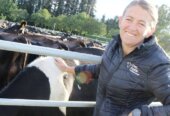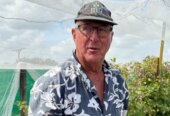
A slight adjustment to the home garage has become something of a haven for Paul and his fellow model railway fans.
For the most part, he’s probably best known in these parts as Paul Murphy the Cambridge Brass Band secretary, or Paul Murphy the bloke with a thing for miniature trains.
Few would realise there are other narratives attached to Paul, layers linking him to a different type of brass altogether and to ground-breaking changes in government policy around social issues.
The first of those is Paul ‘Spud’ Murphy the naval man … the Cantabrian lad who joined the Royal New Zealand Navy in his teens and became one of the youngest to pilot a 2500 tonne frigate, the twentysomething who played pirates with Chinese orphans, recovered bodies from the sea, and squired royalty and dignitaries at glittering functions.
That would be the Paul who has seared into his memory the image of a US destroyer’s bow sinking after the ship was cut in half by an Australian aircraft carrier in the waters off Manila, along with an image of the damaged SS Gothic returned to Wellington after a fire at sea in August 1968. That British passenger-cargo liner, which had served as the Royal Yacht for Queen Elizabeth’s 1954 tour to New Zealand, had been midway between Bluff and Panama when disaster struck.

Paul organised the security during one particularly contentious Waitangi Day.
“You could see right through it, bits of her like a skeleton silhouetted against the sun. There were still flames visible … I’ll never forget that sight.”
He took on the role as commanding officer of a fisheries patrol craft, just six months shy of his 21st birthday.
“I was legally too young to drink or go to the pub, but I could order as much duty-free booze as I liked and I could arrest people,” he says, flashing his trademark grin.
Paul’s chequered life didn’t start and end with the navy.
He went on to carve out a completely different life, one in which he became a doctor of philosophy focused on conducting multi-million-dollar research projects and leading innovative policy-making.
So, for the Christchurch-born boy with deep military roots, things turned out really rather well – long before there was a miniature train or even a trumpet in sight.
His family service roots were extensive. Paul’s great-grandfather had been in the Crimea, his grandfather was in the naval battalion during the relief of Peking (now Beijing) in the Boxer Uprising dramatized in the movie “55 days in Peking”. An uncle was in HMNZS Leander in World War II, and his father was an air force man. Aunts and uncles saw service or were military wives, so when Paul left home after leaving St Bede’s College, and was accepted into just the second year of naval cadets to be trained in New Zealand, there was pride, yet no surprise.
After his initial training, he went to sea and was promoted to sub-lieutenant. It was around then, with his bridge watchkeeping certificate under his belt, that he was permitted to ‘drive’ that frigate.
“The captain wouldn’t give me my certificate before my 20th birthday, because he refused to have a teenager drive his frigate. That was in Hawaii, with the Pacific fleet. When I was 20 and one week, I drove that frigate out of Pearl Harbour.”
When in Hong Kong, Paul helped direct sailors doing community projects, one of which involved an orphanage. While those at home lent support by collecting kids’ clothing, Paul and his crew dressed up as pirates and threw onboard tea parties for the orphans.
There were clearly other attractions, too. “I fell in love everywhere I went … it was awful. But it was a pretty good life.”
He was onboard during fleet exercises off the Philippines when the Australian light aircraft carrier HMAS Melbourne collided with the American destroyer, the USS Frank E. Evans in June 1969. Over 70 sailors died; a joint Australia-US inquiry later found both ships had been at fault. Paul was about to take over the watch on the bridge when news came through that Melbourne had been hit.
“I watched the front half of USS Evans sink. It is one of my most powerful memories.”
Naval life broadened to include a spell navigating an oceanographic survey ship, and as an air traffic control officer for the helicopters aboard a frigate. He travelled the world and clocked up some extraordinary memories, one of which was in Guam in 1969 where he watched lines of American planes coming back from bombing Hanoi during the Vietnam War. He says the US lost 10 percent of its naval air crew on every deployment.
At around 25, Paul came ashore as assistant naval provost marshall, in charge of naval police at the Auckland naval base. He discovered a penchant for law and did a detective’s course at the police college, where a sympathetic Paul brought less fortunate classmates back to his billet at the officer’s mess at Trentham for some upmarket fare.

Paul, far left, with the Cambridge Brass Band at a recent function at St Andrew’s Church.
Part of his role was planning cocktail parties, dinners and receptions. He organised security for a visit by the Tongan king and at contentious Waitangi commemorations and Springbok Tour protests, and was part of the planning team for the Queen’s 1977 Jubilee Tour. His life was a curious mix of trawling through a “black book” to find suitable ladies as guests at formal functions, and choreographing a delicate dance of diplomacy to ensure neither side in any disagreement was seen to be losing face.
Paul was also busy doing advocacy work around naval personnel services, little knowing at the time how well it would dovetail with the plethora of skills he was gathering.
After retiring from the navy as a lieutenant commander in 1988, he enrolled at Victoria University to do a BA degree majoring in social policy and sociology. An early assignment called on students to design a service; Paul’s offering ended up going to parliament and becoming policy, and the university employed him to do research and tutoring work.
A visit to Perth as he approached the end of his degree saw him offered a postgraduate research opportunity at the University of Western Australia, and after returning to New Zealand briefly, he and wife Dianne elected to return to Perth to further his career.
Increasingly buoyed at the prospect of effecting social policy change, he was seconded to the family court of Western Australia to lead a collaborative team to evaluate what was called the Columbus Pilot Project – an innovative programme on how to better manage family court cases involving family violence and child abuse. By then he was Dr Paul Murphy, a post-doctoral scholar at Edith Cowan University in Perth, and a man who had worked as a facilitator in post-separation parenting and stepfamily education programmes for 15 years.

Paul with one of the miniature houses he makes as scene-setters for model railway layouts.
Those years had seen him do extensive research around various social topics, including on life skills for youngsters leaving state care, youth suicide, poverty in stepfamilies, parenting programmes, family law reform, and issues faced by ageing homosexuals – ‘greying gays’, he calls them.
The list of research reports, publications and conference papers attributed to Paul is impressive, as is the significant dollar value put on his research grants and awards over the years. Much of his work has gone on to become policy, and he has travelled internationally to talk to those topics.
All of that now belongs in his past, he says. When Paul and Dianne came home in 2009, it was to Christchurch initially to help look after Paul’s parents. After they died, the couple moved to Cambridge having been dislodged by the February 2011.
“That has still not been resolved.”
Once here, it didn’t take the retired Paul long to find his niche as secretary of the Cambridge Brass Band, and to help steer the Cambridge model railway group – the Greater Waikato Railway Modellers. It’s in these roles he is known locally – as well as supporting the equally intricate work done by Dianne as a member of the local quilting group.
Their endeavours will combine in early September when the quilters and miniature dolls house group will join the miniature train enthusiasts at an expo in the Cambridge Town Hall aimed at showing the range of skills and expertise that can be developed by just having fun.
As for that military family lineage? While the couple’s two boys and two girls clearly display some of their parents’ affinity for detail and precision, none has joined the military.
But who knows – the trend could re-surface somewhere among their five grandsons and one granddaughter.
Time will tell.








